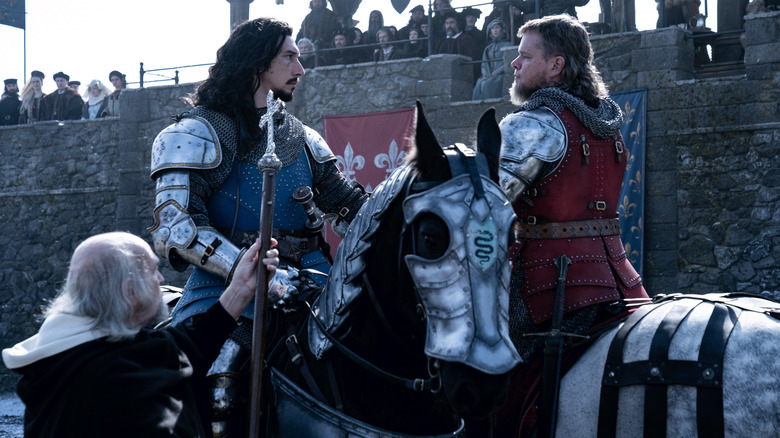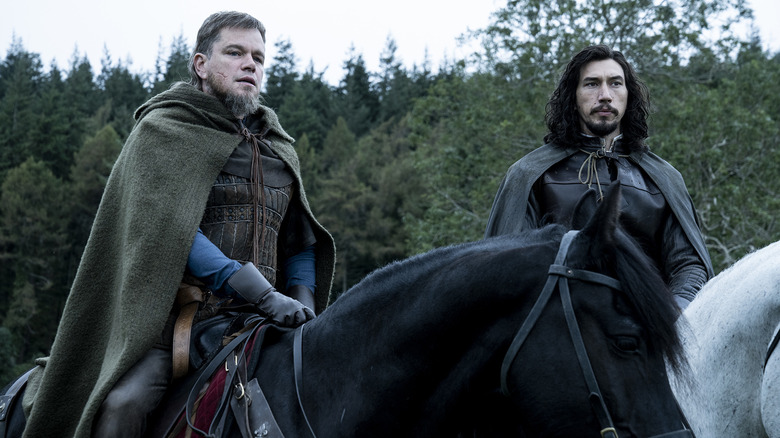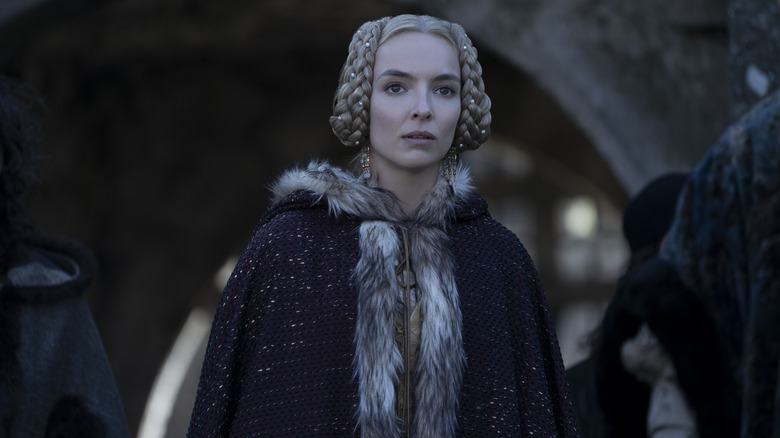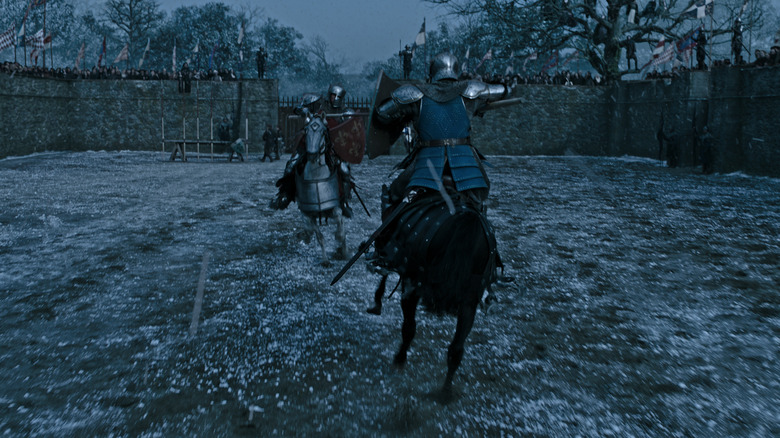
Ridley Scott is back in action with "The Last Duel," his historical epic based on the non-fiction book by Eric Jager. The film follows three specific characters: Jean de Carrouges (Matt Damon), Marguerite de Carrouges (Jodie Comer), and Jacques Le Gris (Adam Driver), all living in France in the 1300s. Jean de Carrouges and Jacques Le Gris entered into the last officially recognized "judicial duel" fought in France. Marguerite, de Carrouges' wife, accused Le Gris of rape, leading to de Carrouges to challenge Le Gris to the duel. The two men would fight to the death — but Marguerite was in danger, too. If de Carrouges' lost the duel, that would mean — in the eyes of the law — the rape accusation was false. And the penalty for a false rape accusation at the time was execution. In other words, if her husband lost the duel, Marguerite would be killed next.
With "The Last Duel" now in theaters, we're going to take a look at the film's dramatic ending. But we can't do that until we look at the film as a whole. So, be warned: massive spoilers follow.
Friends, Enemies, And Perspective

Rather than tell a straightforward story, director Ridley Scott and screenwriters Nicole Holofcener, Ben Affleck, and Matt Damon take a page from Akira Kurosawa's "Rashomon" and present the film's action from three different perspectives, which also effectively breaks the film into three neat acts. The first act follows Jean de Carrouges, the second act Jacques Le Gris, and the third Marguerite de Carrouges.
We learn that, at first, de Carrouges and Le Gris were friends, fighting side by side in battle. However, de Carrouges isn't the best at playing politics. As a result, he's alienated from the grace of the powerful Count Pierre d'Alençon (Ben Affleck, who steals the entire movie with a surprisingly funny, debauched performance). Le Gris, in sharp contrast, is much better at cozying up to people, and he works his way into the Count's favor, thus enabling him to enrich himself. The Count even gives Le Gris land that was initially promised to de Carrouges as part of the dowery of his new bridge, Marguerite.
These developments make de Carrouges sour on Le Gris, and start to think of him as an enemy. And here is where things get particularly interesting. Since each segment of the film is from a different character's perspective, the characters are always behaving slightly differently when various scenes play out and then replay later. In the de Carrouges' segment, de Carrouges is presented as a noble, brave man who loves his wife. Marguerite, in turn, clearly dotes on her husband. At the same time, this perspective shows Le Gris as a bit of a sneaky, conniving jerk.
The second half of the film replays much of what we've already seen, but now from Le Gris' perspective. And it's here where the audience finally starts catching on to what "The Last Duel" is doing. In the Le Gris segment, it's Le Gris who is presented as a good guy, while de Carrouges is portrayed as an annoying, whining failure. Le Gris continually defends de Carrouges when others disparage him, claiming the man as a friend.
At one point, Le Gris finally meets Marguerite. In the Le Gris segment, Le Gris claims he fell instantly in love with Marguerite the moment he laid eyes on her. And Marguerite, in turn, seems openly flirtatious with Le Gris. Things come to a head when Le Gris visits the de Carrouges' castle one day while de Carrouges is away and Marguerite is alone. Le Gris confesses his love to Marguerite, and she rebuffs his advances — but Jodie Comer, who is fantastic in the film overall, plays the scene in a deliberately ambiguous manner. Yes, she turns Le Gris down, but she does so in a way that makes it seem like she's just saying that when what she really wants is to make love to this man. And in Le Gris' eyes, that's exactly what happens. The two have sex — violent sex, but in Le Gris' mind, completely consensual. He even says later that he assumed Marguerite was only saying she didn't want to make love to him out of a sense of honor. But that's not how Marguerite sees things.
Marguerite

While "The Last Duel" could've remained ambiguous, it does take a definitive stand and makes it abundantly clear that Marguerite's segment shows the version of events as they really happened. This ends up changing any preconceived notions we may have had up until this point. While the first half of the movie makes it look like Jean de Carrouges and Marguerite are madly in love, Marguerite's perspective shows us that the marriage is often cold, and Jean is often very cruel to her. When Marguerite confesses the rape to Jean in the first half of the film, Jean is presented as immediately supportive and sympathetic. However, when the same scene plays out from Marguerite's perspective, we see that Jean's first instinct is to immediately think his wife is lying. He even violently grabs her by the throat and demands to know if she's really telling the truth.
The assault scene also plays out again, and, be warned, it's brutal. In fact, the movie as a whole is often shockingly brutal — Scott certainly doesn't skimp on the abundant gore during battle scenes. Here, it's plainly clear that there was nothing consensual about the moment, and that Le Gris really did rape Marguerite — although he certainly does it see it that way, because in his mind, he's the hero of his own personal story.
Jean challenges Jacques to a duel over the rape claim. But first, the three main characters have to submit to a trial first, where Marguerite is mercilessly questioned by powerful men who all think she's lying. She sticks to her story, though — even after she learns that if her husband loses the duel, she will then be immediately executed by being burned alive. Marguerite is pregnant during the trial, and there's some question among the people interrogating her as to whether or not the baby is Jean's or Jacques (the movie never says one way or another; it does make a point to include a scene where, immediately after learning of the rape, Jean demands Marguerite have sex with him so that Jacques isn't the last man she's touched. Although Jean probably doesn't see this as yet another rape, it certainly can be read as one, since Marguerite doesn't want to go through with it but feels powerless to object).
With Marguerite sticking to her story about her rape at the hands of Le Gris, the stage is finally set for the duel, and everyone's fate hangs in the balance. The duel is held off until Marguerite gives birth, and then, the day of battle comes.
The Last Duel

I suppose you could say that "The Last Duel" actually has four acts, with the fourth act being the duel itself. It's a big, gruesome spectacle with Jean de Carrouges and Jacques Le Gris going head to head, jousting, smashing each other with swords and axes, and just beating the living hell out of one another as a crowd cheers and Marguerite anxiously awaits her fate. There's a moment where it looks like Le Gris has the upper hand, but things change quickly, and de Carrouges pins Le Gris down with a blade held above his head and demands that he confess to the crime. Le Gris refuses, declaring that there was no rape. With that, de Carrouges jams his blade into Le Gris' mouth (as I said, the movie is brutal), and finally kills him.
Relieved, Marguerite is reunited with de Carrouges, but the reunion is awkward. They embrace each other for the spectators, but then mount separate horses and ride off through a cheering crowd. In the midst of all this, Le Gris' body is stripped and hung upside down for all to see. Following all this, we're treated to an epilogue. We learn that not long after the duel, Jean de Carrouges died in the Crusades. Marguerite inherited his land (although in real life, their son, who was 10 at the time of his father's death, was the actual recipient) and lived out the rest of her days happy. The film also gives us a title card stating that Marguerite "never remarried." Usually, when true stories throw this sort of thing up on the screen it's to imply, wrong or right, that the wife was so in love with her husband that she could never dream of another man. But here, the implication is clear that Marguerite was happy to remain unmarried and free after her cold marriage to Jean.
Read this next: 14 Remakes That Are Better Than The Original
The post The Last Duel Ending Explained: From a New Point of View appeared first on /Film.
0 Commentaires